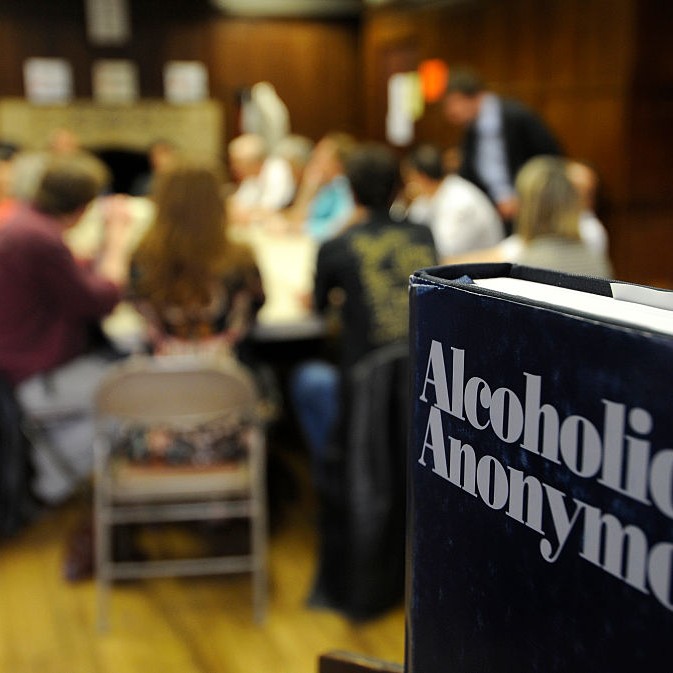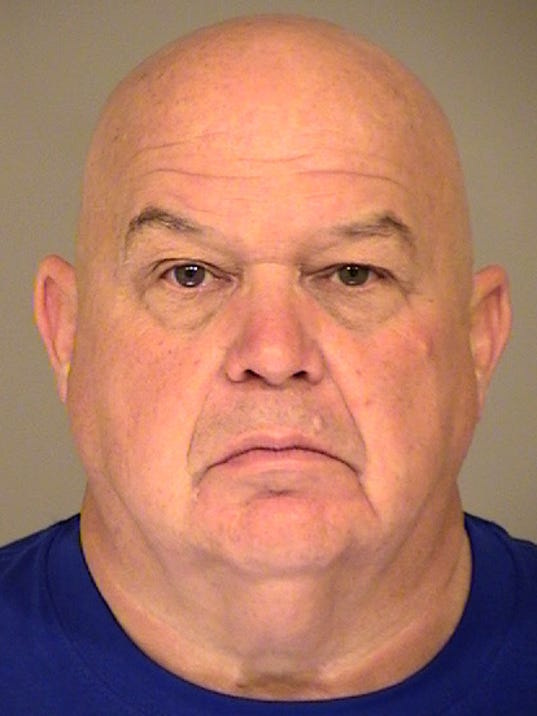
The Culture of Alcoholics Anonymous Perpetuates Sexual Abuse
Women are encouraged to “look for their part” in what’s happened to them.
“I still believe in the foundation of AA because it did save my life and help me get sober almost ten years ago,” says Adrian Wilson. She tells me she had been in the program for six years when she met a man at an Alcoholics Anonymous barbecue hosted by her female sponsor. The man asked for her card, saying he could help promote her clothing business. Wilson says she checked with her sponsor as to whether the man was a “safe” person and was told “yes—he’s an elder with 30 years sober.” A few weeks later, Wilson alleges that she went on a bike ride with him and then stopped by his house for waffles where he proceeded to sexually assault her “in every way, shape, and form.”
Wilson says she drove to her sponsor’s house, hysterical, immediately after the rape where her sponsor told her not to call the police or go to the hospital because “everyone in AA will hate you.” She suggested that instead, Wilson “get on [her] knees and pray, work the steps, and look for [her] part in what happened.”
Wilson says she initially trusted her alleged perpetrator because “elders,” those with many years of sobriety in the program, are considered golden in the AA community—highly respected and put on a pedestal. Wilson ultimately decided to press charges and is now awaiting a second trial nearly three years after the alleged incident. Her first case ended in a mistrial this past summer. Wilson states her AA “family” disintegrated quickly when she began speaking out about the alleged attack.
“I tried to stay in the family because that was my support group and that’s what kept me sober. So, I went into meetings and I talked about it. I said: ‘I was raped by a man in AA,’ and I was hauled out of meetings by various women saying: ‘How dare you say that in a meeting.’ They said that I was going to scare newcomers, that I was going to keep them from getting sober.”
The recent avalanche of allegations against Harvey Weinstein, Kevin Spacey, and other powerful members of the Hollywood community have been a horrifying reminder of the prevalence of sexual assault, harassment, exploitation and abuse in American society. There is something uniquely heartbreaking, though, about the way people who have been sexually abused in AA (and other 12 step groups) are encouraged to “look for their part” in what has happened to them.
In addition to that, the fear that goes along with being cast out of the AA community is about more than a loss of social and emotional support or employment. AA members are repeatedly told that leaving the fellowship will lead them to drink, which will lead them to die and that the community’s welfare is more important than the individual’s. “AA must continue to live or most of us will surely die,” states AA’s First Tradition. “Hence our common welfare comes first. But individual welfare follows close afterwards.”
“I just can’t imagine any female who attends AA for even a brief period of time doesn’t experience some form of sexual harassment,” says Jenny, who wishes to remain anonymous. Jenny was in the program for more than 12 years before walking away. “I would be slapped on the butt and I had people stalk me and the older people in meetings would say ‘Oh, they’re actually really good people and maybe they’re sick and you should pray for them’ and ‘What did you do to make this happen?’ Men in AA are emboldened to behave the way they do because you’re not allowed to have any resentments, and if you do have one the solution is to look at where you fucked up.”
“Look for your part” is a 12 step-ism that appears to have derived from a well-meaning passage from AA’s main text, “The Big Book,” which states: “Putting out of our minds the wrongs others had done, we resolutely looked for our own mistakes. Where had we been selfish, dishonest, self-seeking, and frightened? Though a situation had not been entirely our fault, we tried to disregard the other person involved entirely. Where were we to blame?”
The Narcotics Anonymous “fellowship-approved” document “Working Step Four in Narcotics Anonymous” uses the language to guide their members for through their fourth step “inventory”: “In each situation, try to see where you were wrong, what your motives were, and what your part was.”
What began as a recommendation encouraging members to take personal responsibility for their actions and let go of resentments against others for the sake of their own well-being is now being used in many 12 step groups as a way to put the responsibility for sexual harassment, exploitation, and assault within the community back on the victims themselves.
And while it hasn’t been this way for every woman in the program, a pattern of oppression persists. “AA has absolutely saved my life,” says Amy Dresner, who has been in and out of AA for 20 years, and recently published a memoir about her addiction and recovery called My Fair Junkie. “I was never sexually harassed per se,” Dresner says. “What I did feel happened to me was that I was preyed upon when I was very vulnerable. When I came in and I was new, no girls pulled me aside and said ‘Hey, these are the guys who usually wait for the fresh meat to come in. These are the guys that fuck the newcomers.’ I was fucked multiple times by guys with who had double digit [years of] sobriety while I was still counting days. I was 13th stepped.”
“13th stepping” is a phrase all of the women I spoke to were familiar with. It is not an actual step in the program, but rather an expression commonly used within the fellowship to refer to the practice in which elder members with more years of sobriety sexually pursue newcomers because they’re in a vulnerable state and more open to manipulation. A 2003 study in the Journal of Addictions Nursing showed that 50 percent of the female AA members surveyed had experienced the 13th stepping phenomenon.
In spite of this, Dresner says it’s the responsibility of those entering the program to go in with their eyes open. “If you’re expecting it to be a room full of saints, you’re an idiot. It’s a place where sick people go to get better. It’s a looney bin. Wherever there’s a power hierarchy there’s going to be sexual abuse. AA is no different. There is a power hierarchy,” she tells me.
Monica Richardson was a member of AA for 36 years before she walked away and embarked on a personal mission to expose abusive practices in the 12 step community. She produced a documentary about sexual and financial exploitation in 12 step groups called “The 13th Step,”and states that since starting her blog LeavingAA in 2010, she has received “thousands” of emails from current and former members who have experienced sexual harassment, assault and abuse from other members of “the fellowship.”
One of Richardson’s major points of contention with AA is their refusal to warn newcomers to the program that they may be sitting next to someone who has been court ordered to attend meetings as a condition of probation or parole. AA’s own 2014 membership survey states that 12 percent of members were referred to the organization by the criminal justice system.
“AA needs to warn its members that there could be a sex offender or violent offender who’s been sent there, so be careful who you trust,” Richardson says. She also thinks that the group should tell the court system to stop requiring attendance for violent offenders, that the program should institute a hotline for members to call if they’ve been sexually assaulted by another program member, and that safety guidelines stating that sexual harassment, assault, and exploitation within the group are “not okay” should be read and posted at all meetings. Meeting leaders and sponsors are not required to go through any sort of training.
She also rejects AA’s assertion that the program is a “microcosm of society” where sexual harassment and assault are no more likely to happen than they would anywhere else. “It’s not a microcosm,” she says. “You’re pulling together a group of people who are malfunctioning. They’re addicted to drugs and alcohol. They may have issues with self-esteem and being assertive. And they’re all reading a book from the 1930s.”
I contacted AA’s General Service Office for comment on this story and asked about the organization’s handling of what appears to be a rampant problem. They responded by directing me to two pamphlets released in 2017 which are available for download on their site, “Safety and AA: Our Common Welfare” and “Safety Card for AA Meetings,” which they tell me have been “made available to AA groups in the US and Canada should they choose to utilize them.” The first states that some groups have chosen to address issues including sexual harassment through their “group conscience.” The second states that members can ensure each other’s safety by “walking to your car in a group after a meeting” and also states that if “a situation breaches the law, the individuals involved should take appropriate action.”
When I pressed further, asking for specific answers to my questions, the response was always the same. I asked the rep if asking women to “look for their part” in their sexual assault, harassment, exploitation and childhood sexual abuse was a practice endorsed by the GSO, and was told that the links to the two flyers I was sent, which make no mention of looking for one’s part in abuse, had already “thoroughly and thoughtfully addressed” my question.
Same deal when I asked if the GSO had ever considered establishing a hotline for members of AA who had experienced sexual harassment or assault at the hands of another group member. And when I asked if the GSO had considered alerting newcomers that 12 percent of AA’s attendees were referred to (or forced to attend) the program by the criminal justice system, again, it was: “Refer to the flyers.”
https://tonic.vice.com/en_us/article/7x4m8q/sexual-assault-alcoholics-anonymous

